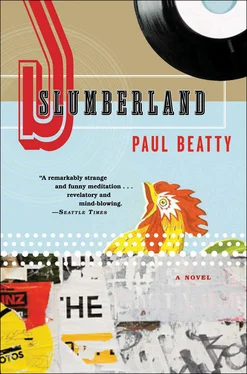Introductions are a serious matter, the import of which I think only the Mafia truly understands. In the criminal underworld there are consequences to expanding the sewing circle. You introduce somebody to the family and your goombah from the neighborhood turns out to be a fuck-up or an undercover cop, you’re held responsible, and the person who vouched for you is held responsible for your transgression, and so on down the line. I feel the same way about music: Problem is, there are no repercussions. Some irresponsible uncle drags you to a GBH concert at the Roxy before you’re ready and it’s like going on a bad acid trip. You’re never quite the same. Yet given all my misgivings about making an introduction, I insisted on being the one to introduce the Schwa to the world and I was willing to assume full responsibility for what ensued.
I had prepared by studying all the great emcees. Brave toast-masters like Symphony Sid, whose houndstooth-sport-jacketed “Oh, man, daddy-o” afternoon-radio equipoise ushered in the swing era. I sat up nights staring at album covers and lip-syncing Pee-Wee Marquette’s slurring, whiskey-breathed “Welcome to the Birdland” castrato. I thought that these masters of ceremonies would inspire me, but when I sat down to write my intro, nothing past the mundane came to mind; lots of words that start with in- and ended in — able: in-domit-able, in-defatig-able, indubit-able , and I swear I took my hand off the pen and, like a player piano mechanically reproducing a hokey Bourbon Street rag, it scribbled out, “Ladies and gentlemen, a man who needs no introduction. .” If anybody ever needed an introduction, it was the Schwa.
I had half a notion to reverse protocol and introduce the audience to the band. Clear my throat and say, “Over-rehearsed and underpaid musicians, allow me to present your fawning fan base. Charles Stone and members of the band, I give you the last group of people on earth with an attention span — the free-jazz audience.”
I finally phoned the Schwa and asked him how he wanted to be introduced.
He simply said, “In German.”
His answer surprised me because I’d never heard him speak a lick of German. He was the stereotypical lazy expatriate for whom German is a dour, unnecessarily serious language. He feels life is morose enough without the mooing umlauts and throat-irritating diphthongs. Even though I knew better, I asked him politely if he spoke German.
“Thirty-some-odd years,” he said proudly, “thirty-some-odd years I’ve lived in this country, and all I can say in German is, ‘ Kann ich reinspritzen? ’ Can I come inside you? What can I say, man? The language just don’t taste right in my mouth.”
He had managed to offend what few sensibilities I have, and I was about to hang up the phone when his voice sputtered through the receiver. “Wait, I can say something else,” he said in an excited pant, “ ‘Kann ich in Ihnen kommen?’ May I come inside you, woman whom I don’t know well enough to address in the informal variant of you? ”
“If you don’t speak German, why do you want me to introduce you in German?”
“So I don’t understand the fucking lies.”
“Lies?”
“Are you going to say, ‘Ladies and gentlemen, I’d like to introduce Charles Stone, an old, persnickety, impotent everyday-except-Thursday, muscatel-in-a-plastic-cup-at-four-in-the-afternoon-drinking motherfucker. Let’s give him a warm welcome and hope this jazz dinosaur completes the set before he dies’? No, you’re not. So whatever you say, say it in German. Bullshit sounds good in German.”
He was right, bullshit does sound good in German. In any of the dialects high, low, middlebrow, or guest worker, I can never tell if a person is lying. Come to think of it, I never even suspect them of lying. I think it started with the cigarettes and Günter Grass, but more so the cigarettes. I never had much of a habit, a pack a week, pack and a half if I was waiting on the results of an HIV test, but as my German improved I began reading The Tin Drum, The Rat, and the cigarette warnings on my Marlboro boxes. The print was the size of a newspaper headline and just as starkly worded: SMOKERS DIE EARLIER, SMOKING DAMAGES THE SPERM AND DECREASES FERTILITY, SMOKING IS A SIGN OF LOW SELF-ESTEEM, FEELINGS OF INFERIORITY, AND IS SCIENTIFICALLY LINKED WITH GROUP THINK AND MOB VIOLENCE. There was none of the microscopic wishy-washy wording of the American warning labels. No “may causes” or “might lead tos.” Gradually I stopped smoking and began to believe everything I read and heard as long as it was in German or the New York Times (a paper printed in a font that looks suspiciously like German). However, agreeing to introduce him in German didn’t solve all my problems. I still didn’t know what to say.
It’s no accident that I’m a DJ: I’m a copycat at heart, and as a plagiarist of rhythm I need a source. Someone else’s idea that I can cut and paste into an “original” creation, but I couldn’t translate Alan Freed, Funkmaster Flex, or Symphony Sid — there’s no words for daddy-o or fresh new joint in German. I tried to think of a German impresario and could come up with only one name. Ruldolf Hess, the master of ceremonies for the master race. His signature line echoed in my head. “Hitler ist Deutschland! Deutschland ist Hitler!”
I winced, yet with a little alteration and less flying spittle it’d make a fine closing statement. I’d be paraphrasing the Third Reich’s publicity agent, who himself was only paraphrasing Keats.* I’m rationalizing, I know, but I take some comfort in the fact that humanity is united by its latent fascism, and that is as true now as it ever was and will ever be.
I stepped in close to the microphone, enjoying the sensuous tease of the cold crosshatched steel on my lips. Nothing sounds as believable as little white lies told in amplified German.
“Ich bin sehr stolz, jetzt den Star unserer Show zu präsentieren. Sein Klang ist der Klang des Jazz, der Klang der Freiheit — ein Klang, der nicht zu imitieren ist, die durch hundert berühmte Platten in aller Welt bekannt geworden ist. Er wird von Uli Effenberg am Piano, Yong Sook Rhee an der trompete, Sandra Irrawaddy, Soulemané Eshun, und Willy Wow begleitet. Meine Damen und Herren — Charles Stone ist jazz. Jazz ist Charles Stone.”
The applause was gracious, warm, and buoyant, and though it wasn’t mine to bask in, I stepped off the stage and waded into it,letting the clapping and huzzahs lap at my body in small, exuberant waves. The lies were nothing serious, exaggerations of opinion more than falsehoods. What I said was, “He’s the sound of jazz, the sound of freedom, a sound that cannot be imitated, that has become known worldwide through a hundred celebrated records. With Uli Effenberg on piano, Yong Sook Rhee on saxophone, Sandra Irrawaddy, Soulemané Eshun, and Willy Wow accompanying. Ladies and gentlemen — Charles Stone is jazz. Jazz is Charles Stone.” Okay, the “hundred celebrated records” was an outright lie. And, I confess, I cribbed the intro from Leonard Feather’s 1954 introduction of Billie Holiday to Cologne.
The Schwa took the stage before an audience as still as a herd of antelope who’d caught a predator’s scent. It was that rare absolute stillness that occurs only after accidentally breaking a neighbor’s window, shooting your best friend in the belly, or before the creation of the universe. And having busted many a window, witnessed a shooting or two, and created more than a few mix-tape universes in my day, I knew that that preternatural silence is usually momentary and often followed by earsplitting frenzy. So as a man haunted by a lifetime of sound, the silence was a condition to be cherished, held onto, and appreciated the way an overwrought mother appreciates a sleeping baby.
Читать дальше












